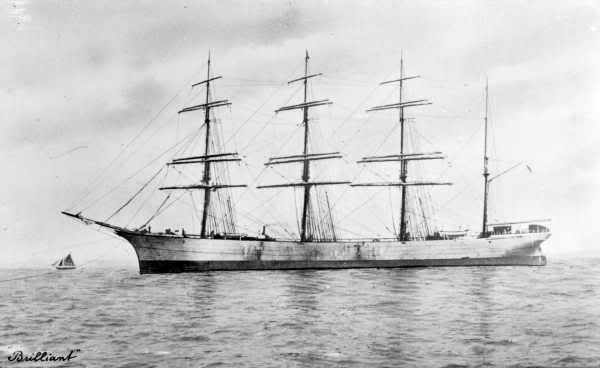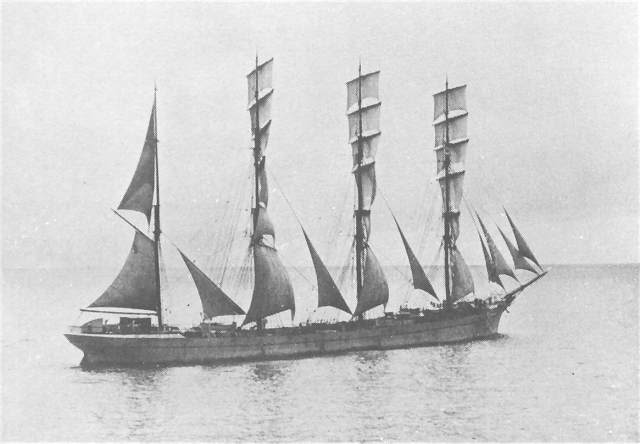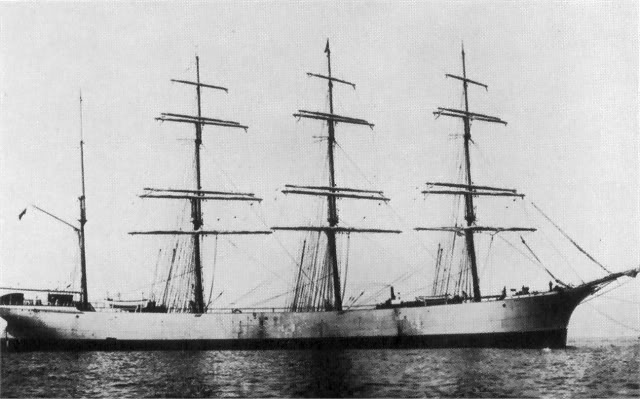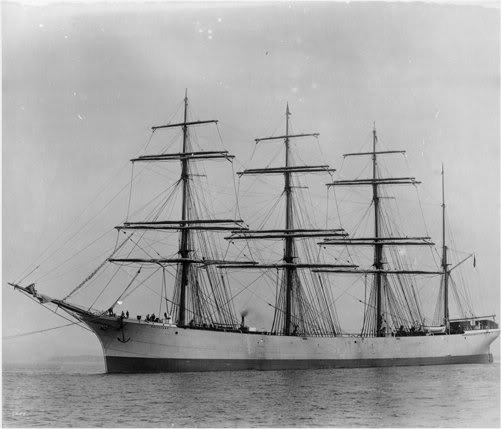Auke Visser´s Esso UK Tanker's site | home
Brilliant - (1901-1914)

"Brilliant" was build in 1901 and sold to Tank Storage & Carriage Co., Ltd.
The "Brilliant", one of the world's two largest four-masted sailing ships during the early 1900s,
could carry nearly 1.5 million gallons of oil, all in five-gallon cans.
"Brilliant" - 5.1901 - 3,765 GT
Built by Russell & Co., Port Glasgow.
Measurements: 352 feet length X 49 feet breadth.
Four-masted steel barque.
1912: (Tank Storage & Carriage Co. Ltd.)
1914: "Perkeo" (Deutsch-Amerikanischie Petroleum-Gesellshaft).
1915: "Bell" (A. Monsen, Tonsberg). Sold as a prize of war.
30.3.1916: Torpedoed by submarine, sank off Ushant.
When launched, "Brilliant" and her sistership "Daylight" were the largest windjammers under the british flag and the
largest four-masters in the world. They could carry 150,000 cases of oil. Because the water ballast tanks of
2,000 tons were converted to carry cargo, the ships survived the transition to bulk oil carrying, which started in 1910.
The conversion was, indeed, made in that year at New York. The ships were the only Anglo-American conversions
from case oil.

"Brilliant".

"Brilliant".
Sailing vessel "Brilliant".
Brilliant
A four-masted steel barque built in 1901 by Russell & Co., Port Glasgow.
Dimensions 107,40×14,95×8,58 meters [352'5"×49'1"×28'2"] and tonnage 3765 GRT and 3609 NRT.
Rigged with royals over double top and top-gallant sails.
Together with her sistership Daylight the largest four-masted barque ever built.
1901 May
Launched at the shipyard of Russel & Co., Port Glasgow, for Anglo-American Oil Co., London.
1914 July 16
Sold to F. Laeisz, Hamburg, and renamed Perkeo. Command of the ship was given to Captain Hinrich Nissen.
1914 August 6
Captured by a British cruiser on voyage New York to Hamburg and was confiscated as a prize of war. Was renamed Bell
1915 April
Sold to A/S Bell (Alf Monsen), Tönsberg, Norway, for £ 12.200. Assigned the Official Norwegain signal WKDT.
Captain Thv. Ellingsen.
1916 March 30
Sunk by the German submarine U-44 in postion 48°50' N, 7°40' W, some 70 nm SW Scilly Islands on voyage from Portland, OR, to Britain with wheat.
The entire crew were able to reach Liverpool after having been picked up by the steamer City of Stockholm.
Brilliant
Steel 4-masted barque LOA 353,‘ Beam 49', Depth 28', 3765 gross tons, 14-8,000 cases
Built 1901 at Russel1’s, Greenock, Scotland, for Anglo-American, at an original cost of £54,000.
This ship and the one which followed her from the same shipyard, DAYLIGHT, Were the largest four-masters in the World. They Were made of steel throughout, except their topgallant masts and royal yards, which were of Oregon pine. The tips of their rnainmasts scraped the underside of Brooklyn Bridge at 173' from the deck. They carried a crew of 46 men.
BRILLIANT’S career was not long, but it was certainly remarkable. She carried case oil With the rest of the clippers until 1910, when the trend to bulk began to gain impetus. At that time storage tanks were being constructed at most of the Far Eastern ports: it had been found more economical to carry the oil across the Pacific in bulk and package it for the market at the ports of destination.
This radical change in method put most of the case-oil clippers on the skids. BRILLIANT, however, had ballast tanks with a capacity of 2000 tons. In 1910 these were converted to carry oil in bulk, enabling her to survive in a changed world.
Four years later, in July 1914, she was sold to a German nitrate firm. Under the German flag, she left New York in ballast to cross the Atlantic and report to her new owners. A few days later, WW1 broke out, and when the unsuspecting BRILLIANT approached the English Channel she was seized by a British cruiser and hauled into prize court as a capture.
Subsequently she Was sold to a Norwegian firm and renamed BELL. Her first assignment was to go to Chile for a load of nitrate. In March 1916, she was once again off the English coast - and once again she was met by an armed vessel. This time it was a German U-boat, which promptly fired a torpedo and sank the BELL, ex-BRILLIANT.
Destiny was in an ironic mood that day.
|
